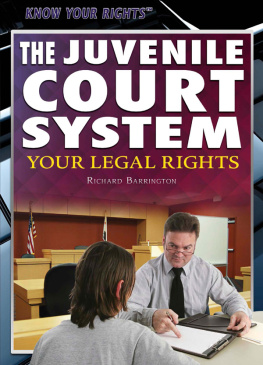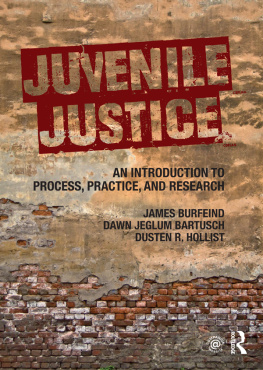
Juvenile Risk and Needs Assessment
This book takes a comprehensive, analytic approach to understanding Juvenile Risk and Needs Assessment (JRNA), covering elements relevant to how the practice affects youths cases and the juvenile justice system. The work draws on both analysis of the extensive research on risk and needs assessment in the juvenile justice system as well as data from the authors recent work in the area. Authors Sullivan and Childs have extensive experience in teaching about and doing research on the juvenile justice system, including multiple studies on juvenile risk and needs assessment tools and their implementation.
This expansive, integrative book leaves readers with a realistic sense of where things stand on the theory, research, policy, and practice of JRNA. By bringing together existing ideas and assessing them in depth, it identifies possible future paths and sparks ideas for improving the juvenile justice response to delinquent and at-risk youths.
Juvenile Risk and Needs Assessment is essential reading for scholars of juvenile justice system impact and reform as well as practitioners engaged in youth and juvenile justice work ranging from the preventive to the rehabilitative stages.
Christopher J. Sullivan is Professor and Director of the School of Criminal Justice and Criminology at Texas State University. He received his doctorate from Rutgers University in 2005. His research interests include developmental and life-course criminology; juvenile delinquency and juvenile justice; and research and analytic methods. He has published more than 90 journal articles and book chapters on those and related topics. He is author of Taking Juvenile Justice Seriously: Developmental Insights and System Challenges (Temple University Press, 2019), which was selected as an Outstanding Contribution by the American Society of Criminologys Division of Developmental and Life Course Criminology in 2020. Dr. Sullivan has been named a 250th Anniversary Fellow at Rutgers University and a Fellow of the Graduate School at the University of Cincinnati for his research and has received award recognition for his mentoring and teaching of graduate students and academic service. He has been data analyst or Principal Investigator (PI) on several federally or state-funded projects in juvenile justice practice and policy. Professor Sullivan has been Co-Editor of the Journal of Research in Crime and Delinquency since 2017.
Kristina K. Childs is an Associate Professor in the Department of Criminal Justice at the University of Central Florida. She received her doctoral degree in Criminology from the University of South Florida in 2008. Then, she was a post-doctoral fellow for the John D. and Catherine T. MacArthur Foundations Models for Change: Systems Reform in Juvenile Justice initiative in Louisiana. Her main research interests include juvenile risk and need assessment practices, evaluation of prevention and intervention programs for at-risk youths, and the effectiveness of mental health and de-escalation training and education for front-line juvenile justice decision-makers. She has published more than 25 academic articles and book chapters on juvenile justice issues. To support her research, she has received over $1 million in external grants from the National Institute of Justice, Substance Abuse and Mental Health Services Administration, and the Bureau of Justice Assistance.
Routledge Studies in Juvenile Justice and Delinquency
Juvenile justice matters are of critical concern in both the United States and around the world. Books in the Routledge Studies in Juvenile Justice and Delinquency series explore mechanisms, consequences, insights, and innovations in the field of juvenile justice and its responses to delinquency. Each monograph will examine new areas of empirical and theoretical inquiry, provide an agenda-setting discussion of important concepts and controversies surrounding juvenile justice and delinquency, and seek to encompass a transnational or global approach to the issues addressed. The series will be a resource for the international community of undergraduates, post-graduates, researchers, practitioners, and policymakers concerned with juveniles and families caught up in or at risk of engagement in delinquency and justice system involvement.
Series editor David L. Myers
Due Process Protections for Youth
Defense Counsel Policies and Disparity in the Juvenile Justice System
Emily K. Pelletier
Norms of Violence
Violent Socialization Processes and the Spillover Effect for Youth Crime
Aime X. Delaney
Explaining Variation in Juvenile Punishment
The Role of Communities and Systems
Steven N. Zane
Youth Violence in Context
An Ecological Routine Activity Framework
Eileen M. Ahlin & Maria Joo Lobo Antunes
Juvenile Risk and Needs Assessment
Theory, Research, Policy, and Practice
Christopher J. Sullivan and Kristina K. Childs
First published 2022
by Routledge
605 Third Avenue, New York, NY 10158
and by Routledge
2 Park Square, Milton Park, Abingdon, Oxon OX14 4RN
Routledge is an imprint of the Taylor & Francis Group, an informa business
2022 Taylor & Francis
The right of Christopher J. Sullivan and Kristina K. Childs to be identified as authors of this work has been asserted by them in accordance with sections 77 and 78 of the Copyright, Designs and Patents Act 1988.
All rights reserved. No part of this book may be reprinted or reproduced or utilised in any form or by any electronic, mechanical, or other means, now known or hereafter invented, including photocopying and recording, or in any information storage or retrieval system, without permission in writing from the publishers.
Trademark notice: Product or corporate names may be trademarks or registered trademarks, and are used only for identification and explanation without intent to infringe.
Library of Congress Cataloging-in-Publication Data
Names: Sullivan, Christopher J., author. | Childs, Kristina K., author.
Title: Juvenile risk and needs assessment : theory, research, policy, and practice / Christopher J. Sullivan and Kristina K. Childs.
Description: New York, NY : Routledge, 2022. |
Series: Routledge studies in juvenile justice and delinquency | Includes bibliographical references and index.
Identifiers: LCCN 2021020200 (print) | LCCN 2021020201 (ebook) | ISBN 9780367422776 (hbk) | ISBN 9781032107356 (pbk) | ISBN 9780367823122 (ebk)
Subjects: LCSH: Juvenile justice, Administration of. | Juvenile delinquency--Prevention. | Juvenile courts.
Classification: LCC HV9069 .S84 2022 (print) | LCC HV9069 (ebook) |
DDC 364.36--dc23
LC record available at https://lccn.loc.gov/2021020200
LC ebook record available at https://lccn.loc.gov/2021020201
ISBN: 978-0-367-42277-6 (hbk)
ISBN: 978-1-032-10735-6 (pbk)
ISBN: 978-0-367-82312-2 (ebk)
DOI: 10.4324/9780367823122
10.4324/9780367823122-1
The operations of the juvenile justice system build on a series of discretionary decisions made about a diverse group of youths who have become involved in the system because of varying degrees of misbehavior. Like the adult criminal justice system, in the last few decades juvenile courts and corrections have largely moved from unstructured, professional judgment to relying more on structured assessment processes as a precursor to making placement and treatment decisions, theoretically limiting discretion and affecting the decisions made by juvenile justice actors. Referring to juvenile probation systems, Wachter ). Such usages heighten the importance of this aspect of the juvenile justice process as it can have cascading effects on a range of decisions by court and correctional personnel, which are expected to affect youth outcomes for the better.





